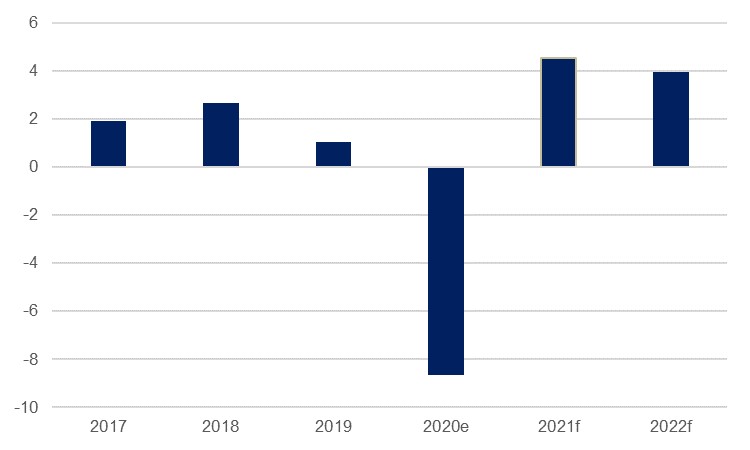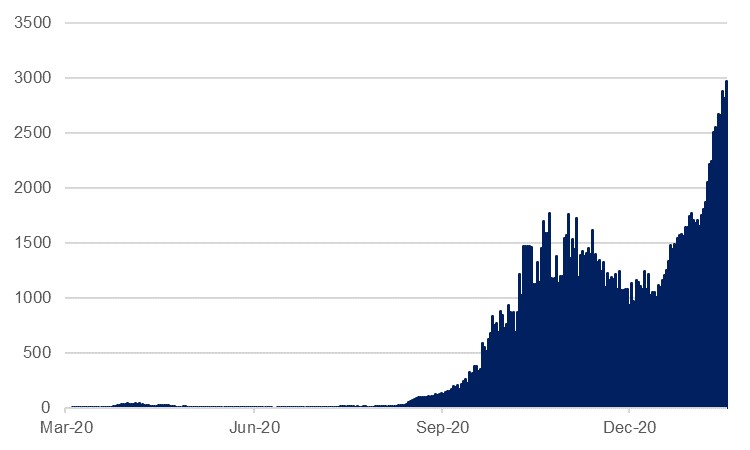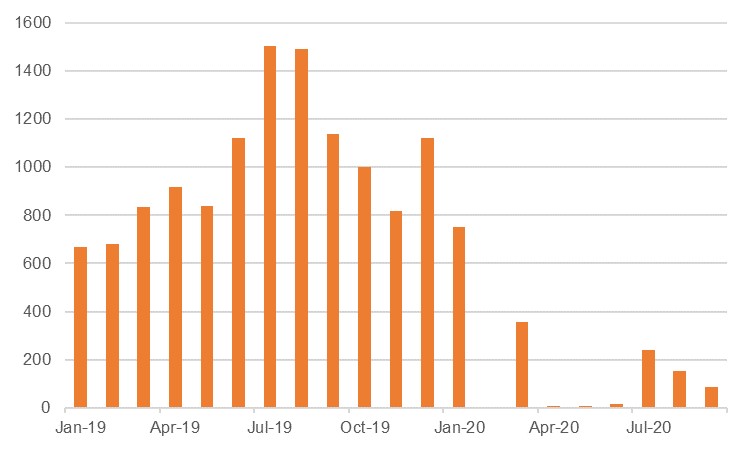
Tunisia’s economy was hard-hit by the coronavirus pandemic in 2020, with a real GDP contraction of -8.7%, according to our estimates. In 2021 we project a fairly robust recovery to the tune of 4.5%, but this will still leave the economy smaller than it was prior to the Covid-19 crisis, and the risks are weighted to the downside given the ongoing prevalence of the virus both within Tunisia itself and in nearby Europe, a key source of visitors for the tourism sector. The recovery will hinge on both the virus being contained, and by the government’s ability to push through any necessary economic support measures. Failure to offer support to those in need will both jeopardise any recovery in consumption, and could give risk to escalating protests of the kind already seen in January.
 Source: Haver Analytics, Emirates NBD Research
Source: Haver Analytics, Emirates NBD Research
At just 1.0% in 2019, economic growth in Tunisia was weak even before the coronavirus crisis began, and with unemployment at 15.1% at the end of that year, households were already under pressure. As the pandemic unfolded, real GDP growth over the first three quarters of 2020 averaged -9.9%, and while the third quarter at -5.5% was an improvement on the -22.3% recorded in Q2, the fourth quarter likely saw a fourth consecutive y/y contraction. Industrial production declined -2.7% m/m in October (last available data), and towards the end of that month new restrictions on activity (including a ban on travel between regions and an extension to the curfew) were introduced as new Covid-19 case numbers rose again. Daily new case numbers averaged 1,312 in Q4, compared with just 142 over Q2.
 Source: Bloomberg, Emirates NBD Research
Source: Bloomberg, Emirates NBD Research
As 2021 has begun the outlook is little improved, as new case numbers have averaged 2,408 over January so far, and we expect that Q1 will present another y/y contraction in the economy as the government has sought to limit the disease’s spread by introducing new restrictions. This included bringing the curfew forward in the day to 16:00 for a four-day lockdown and taking chairs out of cafes, amongst other measures. With working from home and cutting contact as far as possible encouraged, a host of sectors from travel to retail and hospitality will continue to contract.
With Q1 at least set to see negative growth, and any expansion in Q2 likely to be weak, the hope is that a rebound in the second half of the year can boost the Tunisian economy. As with GDP growth projections for countries the world over, this expectation is in large part predicated on an expectation that vaccine rollouts will start to allow restrictions on movement and activity to be eased, and a return to normality to ensue – one bolstered by elevated savings rates in some strata of society allowing a burst in spending. Tunisia aims to begin a vaccination programme in the second quarter, and Algeria has pledged to share some of its Russian-manufactured Sputnik V vaccine with its neighbour. Aside from allowing Tunisians to resume normal activity, as the threat of Covid-19 recedes in the background, visitors could also return to Tunisia.
 Source: Haver Analytics, Emirates NBD Research
Source: Haver Analytics, Emirates NBD Research
Visitor numbers to Tunisia were down -82% y/y over the first three quarters of 2020, and the year-end total was likely even lower given that restrictions in travel were tightened again later in the year following a brief relaxation during the summer. A recovery in the sector will be hugely important for Tunisia’s economy, not only as a direct driver of GDP, but as a major employer and source of FX inflows – although this is less of a concern at present, as a fall in imports has seen FX reserves rise considerably.
Another key variable regarding the potential strength of Tunisia’s recovery will hinge on how much the government is able to do in order to support growth going forward, especially given a widening fiscal deficit and political deadlock. The tourism sector supports thousands of jobs, and many have been left with little to no income as a result of the crisis. The headline unemployment figure has ticked up to 16.2% in Q3 2020, but even this likely does not cover many disillusioned job seekers.
There have been some proactive measures in terms of supporting households so far, with the workers union UGTT announcing in December that it had secured 6.5% wage hike for workers. The government has also facilitated loans to hotel owners. However, this has not been sufficient to forestall ongoing protests by the youth in particular – youth unemployment is closer to 30%. In January there have been consecutive nights of protests in cities such as Tunis, while the phosphate sector has been continually impeded by strikes and protests over the past year or more.
In the face of this unrest, and in a bid to invigorate his government, Prime Minister Hichem Mechici announced a major cabinet reshuffle on January 17. However, it remains to be seen how effective the new cabinet will be in dealing with the challenges facing the economy given that Tunisian politics has been characterised by paralysis since the 2019 elections failed to return a working majority.